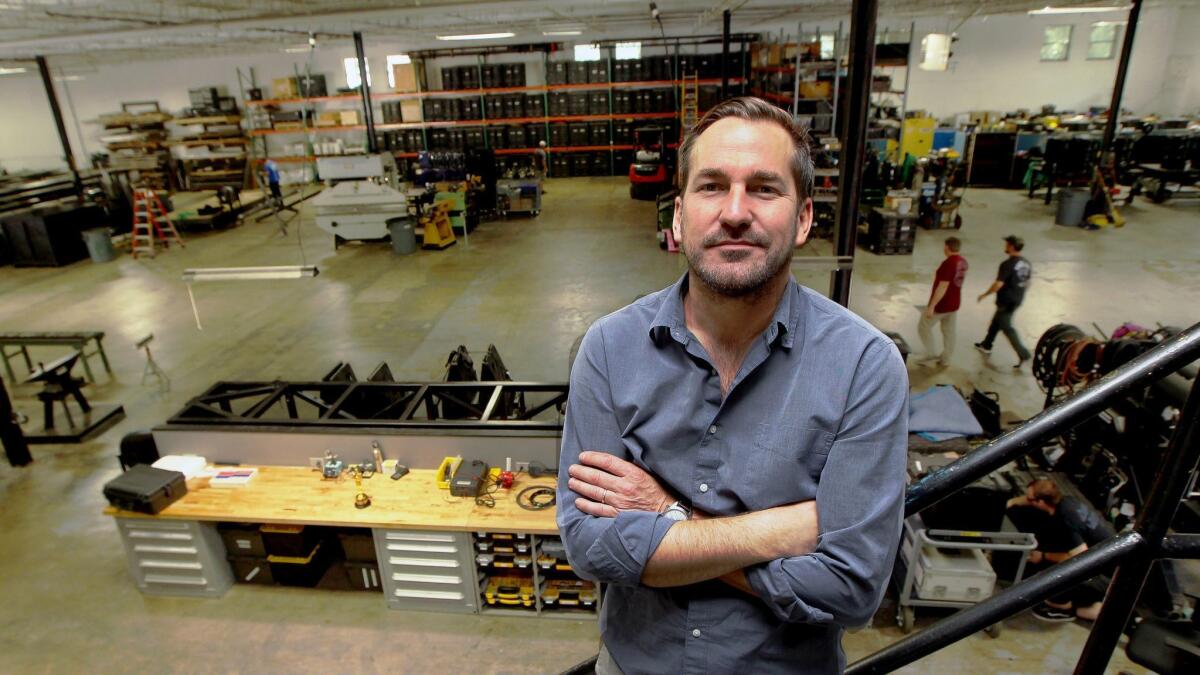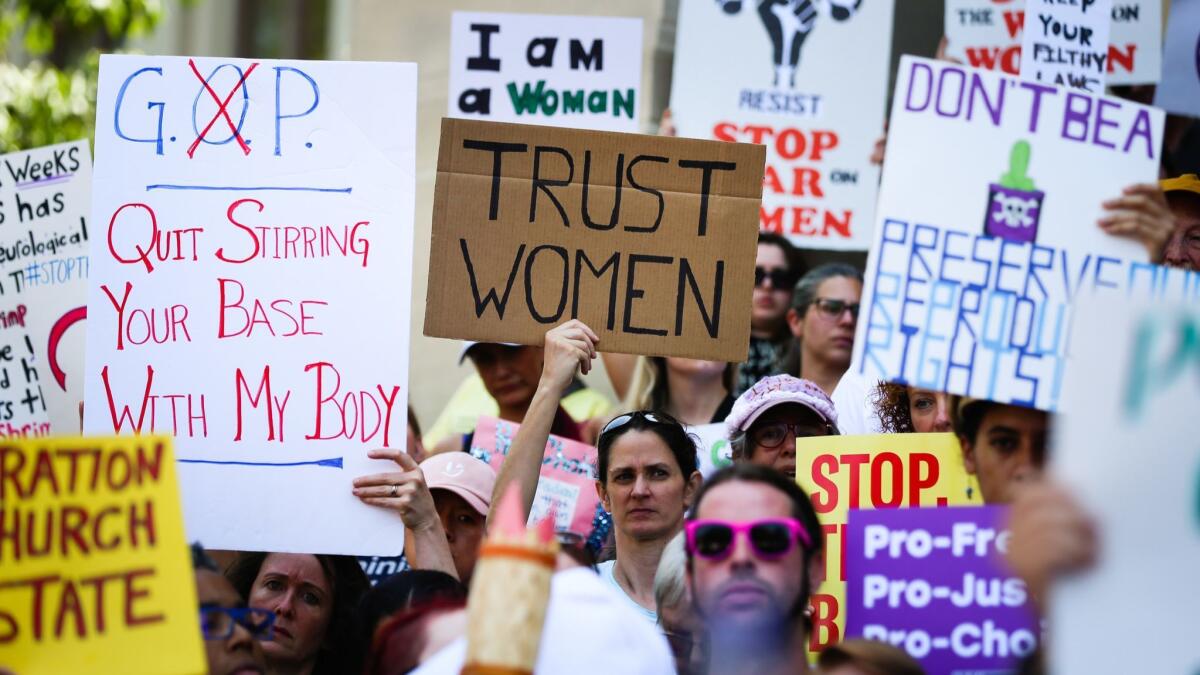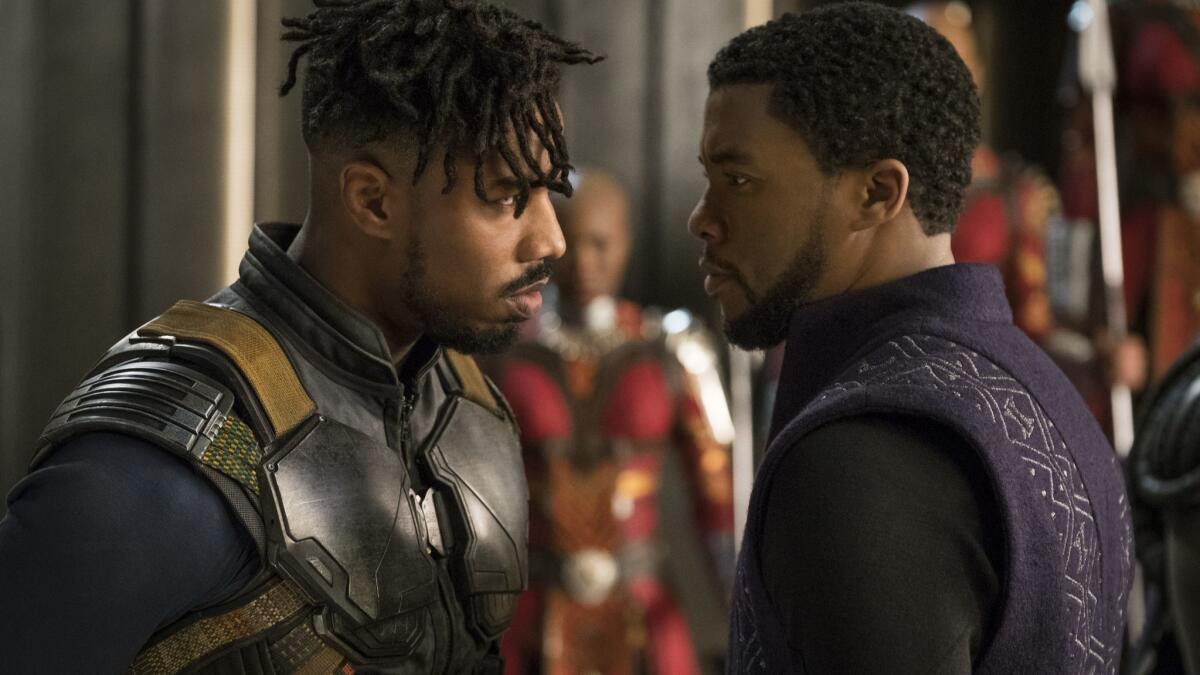Georgia’s abortion ban forces political reckoning among TV and film workers

- Share via
Reporting from Senoia, GA — Zombies lurk beyond the train tracks. They have been here for years, working under lights, swatting mosquitoes, bringing eerie charm to streets of gothic homes and magnolia. Tourists come from as far away as Japan to glimpse the set of “The Walking Dead,” which has become a neighbor in this town of Bible school classes and soft-serve ice cream.
The show, like many film and TV productions, was drawn to Georgia over the last decade by big tax breaks. Legislators were welcoming and the locals, including those in Senoia, adjusted to shooting schedules and the generally liberal inclinations of thousands of set designers, prop masters, actors, makeup artists and others who descended from California, New York and other film states.
J.D. Schwalm was one of them. He brought his family and most of his Los Angeles special effects company to Atlanta in 2016. Since then he has won an Academy Award, patented a car cannon and learned not to talk politics at barbecues. But threats of a Hollywood boycott over Georgia’s new anti-abortion law have upset genteel conversation and exposed the visceral divide between the entertainment industry and Southern conservatism.
“It’s a cultural struggle between faith and finance,” said Rev. John Talley, pastor of the First Senoia Baptist Church. “These movie companies were given generous financial breaks. We’re grateful for their economic stimulus. But as a Christian, I value the unborn child more than Hollywood.”
As a Christian, I value the unborn child more than Hollywood.
— Rev. John Talley, pastor of the First Senoia Baptist Church
That kind of stark declaration has forced Schwalm, who is working on “Conjuring 3,” to a reckoning over differing opinions on abortion and fears by entertainment workers here that a boycott will take their jobs: “Is this issue enough for me to leave Georgia? My kids and wife love it here. There’s a lot of work. It hurts me that the state passed this bill. But leaving won’t change it. And you’re not going to change Georgia from Los Angeles. You have to stay and have dialogue.”
Kara Schaub has similar sentiments. She landed here from Los Angeles to be a set decorator. “I keep my crazy feminism at home. I don’t wear my Wonder Woman punching Donald Trump in the face T-shirt,” she said. “But little by little Georgia is becoming more of a purple state and the film industry is contributing to that. I never felt I could put down roots in L.A. I rent a four-bedroom house here for the same price as my old 400-square-foot apartment in North Hollywood.”

Cultural Divide series: Conversations across America ahead of the 2020 election »
Abortion has long been one of America’s most combative political and moral issues. Much of the furor around the Georgia law, which forbids abortion after a fetal heartbeat is detected, is emblematic of wider battles between left and right on immigration, health care, guns and race in a nation increasingly polarized since President Trump took office.
Evangelicals portray Hollywood as an elitist carpetbagger peddling bankrupt morals. But a number of those in the entertainment industry here are conservative, including crew members who support Trump and a set worker who named his dog after the president. Trump won Georgia with 50.4 percent of the vote in 2016. Two years later, though, progressive TV and film transplants helped the state nearly elect Democrat Stacey Abrams as its first black female governor.
Liberals celebrated Abrams’ campaign as a sign that Old South attitudes were succumbing to younger generations in a state where film crews and production companies, including Tyler Perry Studios, are more diverse than in Hollywood. But liberals were whipsawed last month when newly elected Republican Gov. Brian Kemp rallied his conservative base by signing one of the most restrictive abortion laws in the country.
Such a landscape blurs assumptions on both sides and reveals the fissures running through Georgia politics. It leaves film and TV workers troubled over the state’s conservative legacy. They’re also angry at calls for boycotts by celebrities and threats by studio leaders, including Ted Sarandos at Netflix and Bob Iger at Disney, to stop production, which could jeopardize jobs while further emboldening right-leaning politicians. Abrams opposes a boycott for those reasons.
The abortion law is scheduled to take effect next year. But the law, like ones in Louisiana, Alabama and other states, is certain to be challenged in the courts. The conservative strategy is to push the abortion issue before the Supreme Court in an effort to overturn Roe vs. Wade. That tact has kept much of Hollywood from calling for a boycott as studio heads wait to see how legal battles play out.

Georgia’s film industry accounts for 92,000 jobs and generates about $3 billion in annual revenues for the state. Studios receive up to 30% back on their investments through tax credits and other incentives that brought Disney here for “Avengers: Endgame” and Marvel Studios for “Black Panther.” The state is also a hub for TV shows, including Netflix’s “Stranger Things” and “Ozark.”
Hollywood and the Republican right have clashed for years over the morals of the silver screen and the piety of the steeple. The entertainment industry and civil rights groups in recent years battled Georgia over proposed antigay legislation and North Carolina over a “bathroom bill” that critics said discriminated against transgender people. The furor around Georgia’s abortion law raises deeper questions over how Hollywood and conservatism can coexist in an age when Trump is hardening cultural lines and entertainment workers must balance their politics with their livelihoods.
This industry employs a lot of women and we can help incrementally change the politics here.
— Jaime Rosegren, on-set dresser
“Georgia’s politics is rooted in white supremacy. It’s not going away overnight. We have to keep fighting against gerrymandering and voter suppression,” said Jaime Rosegren, an on-set dresser who moved to Atlanta from New York five years ago with her husband, Rob, a gang boss in set decoration. “The knee-jerk reaction of Alyssa Milano and others calling for a boycott doesn’t help. This industry employs a lot of women and we can help incrementally change the politics here.”
Rosegren sat the other day at an Atlanta cafe with Jared Fleury, a prop master who moved to Georgia 15 years ago. The state’s lower cost of living allowed them to buy bigger homes than they could have afforded in Los Angeles. Rosegren even hired dog walkers and landscapers. The quality of life is better, both said, even as they acknowledged that Atlanta is a “blue dot” in a red, rural sea.
“I left Hollywood to get out of the rat race,” said Fleury, who like Rosegren is a member of the International Alliance of Theatrical Stage Employees. “I wanted a different lifestyle. The diversity here is amazing. The film industry in L.A. is largely white and male. Here it’s men, women and people of color. But the politics of Georgia definitely affects my thinking. Will I be able to work here? Will there be work?”
Politics is kept off film sets here, but differences between liberals and conservatives, many of whom are native Georgians, are palpable if mostly left unspoken over religion, Trump, gun rights and immigration.
“Just because we’re in a union doesn’t mean we’re all progressive,” said Rosegren, her shoulder tattooed with a scene from “The Jungle Book.” “A lot of guys in our union agree with the abortion bill. I’m 37 and some union men incessantly harp at me for not having children. They have traditional views. But this abortion law means women will die. Women will go to prison.”
Fifty minutes south of Atlanta, past pine and kudzu, Senoia, a one-time railroad and cotton gin town, rises like a well-swept artifact lifted from the pages of Southern Living magazine. All is hospitable — it’s the kind of place where you’d sip a gin and tonic on the front porch — except for “The Walking Dead” store and the cosplay man with an eye patch and sidearm, who leads tourists toward zombie territory at the edge of Main Street.
“The film industry is very much in the fabric of our life,” said Rev. Jesse Dukes of the Legacy Christian Church. His sister is a set designer; the house of his child’s friend appeared in “Avengers: Endgame.” “We did a sermon series on ‘The Walking Dead.’ We wanted to explore how we all struggle with those interests that make us less than human. The zombies are mindless consumers.”
Dukes said much of the debate over abortion falls along generational lines and comes from a fear that what once was will be no more.
“I remind older people here that the world fundamentally changed with the internet,” said Dukes, sipping coffee in an empty vestibule on a humid afternoon. “But a small rural world is a closed community that doesn’t want to change. They feel they’re being flooded with the reality of different perspectives. So they say, ‘Let’s circle the wagons.’ The abortion bill is the latest movement in a culture war. But Hollywood gets disingenuous too. White Southern people are an easy target for caricature.”
Unlike Talley, whose First Senoia Baptist Church is about a mile away, and who leaves no doubt of his opposition to abortion, Dukes believes dilemmas of morality and women’s rights are rarely clear-cut.
“I wouldn’t preach on abortion today. It’s too divisive,” he said. “I know there are women in our congregation who have had abortions. They have experienced deep shame in terms of their faith. It’s incredibly painful. I don’t think it’s a good idea to get up and toe the party line. There are nuances. Both sides are creating these casualties of war. I wonder, between Hollywood and the Southern right, who will be the first to listen.”

J.D. Schwalm has similar feelings. His Innovation Workshop in Atlanta is a neat grid of computerized lathes, battery boxes, drills, metal shavings and computer screens that spin special effects in three dimensions. Depending on the job, the shop employs between 65 and 200 workers. Schwalm stopped and explained how his nitrogen and compressed air cannon lifts stunt cars into the air; he nodded toward a wooden cutout of a Na’vi, the forest-dwelling tribe in James Cameron’s upcoming “Avatar 2.”
“I’m pretty heavily rooted in Georgia now,” said Schwalm, who moved here after working on “The Fate of the Furious.” If Hollywood left the state over the abortion bill, he said, “It’s not going to have as big an impact as people think. Look at all the swinging cranes over Atlanta. But the politics of it all is scary.”
After he won the Academy Award this year for “First Man,” Schwalm was asked by Gov. Kemp’s office how Hollywood might react to an abortion ban. He answered that there would be calls for a boycott. Since Kemp signed the bill into law last month, Schwalm, who has two small sons, has wondered how to reconcile the liberal industry that gives him work with the conservative state he has adopted.
“I’m so against this bill,” he said. “What’s going on in Georgia politics is happening across the country. Everyone is thinking short term. From the president to Congress, it’s all about enacting as much change as they can while they’re in power. It’s not good for the country’s future. The point of our Constitution is for people to meet in the middle. That’s not happening.”
Twitter: @JeffreyLAT
More to Read
Only good movies
Get the Indie Focus newsletter, Mark Olsen's weekly guide to the world of cinema.
You may occasionally receive promotional content from the Los Angeles Times.











